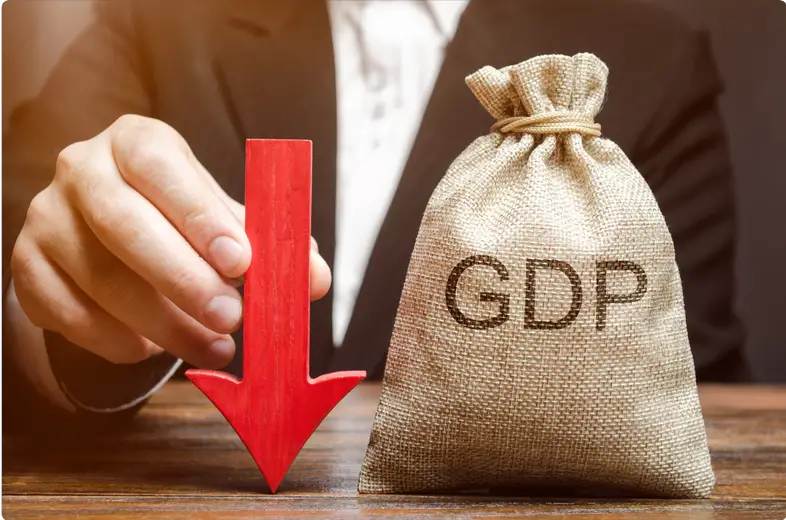Gross domestic product (GDP) is a crucial measure of a country’s economic health and is often used as a key performance indicator for policymakers, businesses, and investors. It provides a comprehensive snapshot of a country’s economic activity. Understanding GDP is vital for assessing a country’s standard of living, economic growth, and overall economic health.
In this article, we will delve deeper into nine essential things you should know about GDP to comprehend its significance and limitations better.
1. GDP Measures Economic Output
Gross domestic product is one of the most widely used and important economic indicators to assess the performance of an economy. It is a measure of the total economic output of a country, and it reflects the market value of all final goods and services produced within a country’s borders during a specific period.

GDP calculation includes various economic activities, including agriculture, manufacturing, construction, and services. It encompasses tangible goods, such as cars, appliances, and clothing, and intangible goods and services, such as software, patents, and entertainment.
The importance of GDP lies in its ability to provide a snapshot of a country’s economic health at a particular moment. A rising GDP usually indicates that an economy is growing, while a falling GDP signals that an economy is contracting. Policymakers and analysts use changes in GDP to help identify trends and make decisions about monetary and fiscal policies that can help stimulate economic growth.
So, we now know what GDP is. Let’s look at some more things you need to know about this important economic indicator.
2. GDP per capita provides a better picture of Economic Well-being
While GDP measures the total economic output of a country, it does not consider the population’s size. Analysts and policymakers often turn to GDP per capita to obtain a better picture of economic well-being, which measures the average economic output per person in a country.
GDP per capita can be found by dividing a country’s GDP by its population. For example, if a country has a GDP of $100bn and a population of ten million, the GDP per capita would be $10,000. This measure provides a better understanding of the economic well-being of a population as it calculates how much economic output is available on average to each person in the country.
GDP per capita is often used as an indicator of a country’s standard of living. Countries with a higher GDP per capita tend to have higher levels of economic development, which can lead to improvements in education, healthcare, and other quality-of-life factors. However, it is essential to note that GDP per capita does not provide a complete picture of a country’s economic well-being as it does not consider income distribution or other factors affecting living standards.
3. GDP does not take into account Non-Monetary Factors
GDP has limitations when it comes to measuring overall well-being. One of the main criticisms of GDP is that it does not include non-monetary factors that contribute to a high quality of life.
For instance, GDP does not factor in environmental damage or the sustainability of economic growth. A country may have a high GDP due to significant industrial activity, a blossoming business sector, or natural resource extraction. Still, if this activity leads to environmental degradation and pollution, the overall well-being of citizens may be negatively affected.
Similarly, GDP does not capture social factors such as social cohesion, political stability, and equality. A country may have a high GDP but still have significant social issues, such as high crime levels, political corruption, or social unrest.

Finally, GDP does not account for happiness or well-being. A country may have a high GDP, but if citizens experience high levels of stress or poor mental health, the population’s overall well-being may be low.
Given these limitations, it is essential to use additional measures of well-being to provide a complete picture of a country’s economic and social development. Measures such as the Human Development Index (HDI) or the Genuine Progress Indicator (GPI) attempt to capture a broader range of factors contributing to overall well-being, including environmental sustainability, social inclusion, and individual happiness.
4. Government policies can influence GDP Growth
Government policies such as tax cuts, infrastructure spending, and monetary policy can influence GDP growth. An increase in government spending on infrastructure can lead to increased economic activity and higher GDP growth. Similarly, a decrease in interest rates can lead to increased borrowing and investment, which can also lead to higher GDP growth.

5. GDP comparisons between countries can be Misleading
When comparing GDP between countries, it is crucial to adjust for differences in population sizes. A larger country may naturally have a higher GDP than a smaller one, but this does not necessarily mean its citizens are better off. To make accurate comparisons, GDP should be expressed per capita, as previously discussed.
Exchange rates can also have a significant impact on GDP comparisons between countries. Exchange rates are the rates at which one currency can be exchanged for another. If two countries have different currencies, their GDPs must be converted to a common currency for comparison. However, exchange rates can fluctuate frequently and significantly, making it challenging to compare GDP accurately between countries.
In addition, the cost of living can vary significantly between countries. For example, the cost of living in a developed country like the United States may be much higher than in a developing country like India. Therefore, even if India’s GDP is lower than that of the United States, its citizens may still be able to afford a higher standard of living due to the lower cost of living.

To account for these differences, economists often use purchasing power parity (PPP) to compare GDP between countries. PPP adjusts for the differences in the cost of living between countries by calculating how much a particular basket of goods and services would cost in each country’s currency. To make accurate comparisons, GDP should be expressed per capita and adjusted for purchasing power parity.
6. GDP can be affected by factors outside of a Country’s Control
Many factors outside of a country’s control can affect its GDP. These external factors can be global economic trends or natural events with significant economic impacts.
Global economic recessions can significantly impact a country’s GDP growth. If the world’s significant economies experience a slowdown, there may be less demand for exports from other countries, which can hurt the GDP growth of exporting countries. Similarly, trade wars can impact a country’s GDP by decreasing the number of goods and services that can be exported, leading to a decline in economic growth.

Natural disasters, such as hurricanes, earthquakes, or pandemics, can also significantly impact a country’s GDP. These events can disrupt production, supply chains, and transportation, leading to decreased economic output. In addition, these events can cause significant damage to infrastructure, which can take years to rebuild, further impacting the country’s GDP growth.
7. GDP can be Unevenly Distributed within a country
GDP does not provide information about how a country’s economic output is distributed. In some cases, a country may have a high GDP but significant income inequality, where a small percentage of the population holds most of the wealth. This can lead to social and political tensions and affect a country’s overall stability.
8. GDP does not measure the Quality of Goods and Services Produced
GDP measures the monetary value of goods and services produced regardless of quality. GDP only considers the monetary value of the goods and services produced within a country’s borders during a specific period. A country may have a high GDP due to producing low-quality goods with short lifespans or negatively impacting the environment. These goods may not provide long-term benefits to the country or its citizens and may even lead to increased costs in the future. Similarly, a country may have a high GDP due to providing low-quality services, such as healthcare or education, which may lead to adverse outcomes for the population.
9. GDP growth is Not Sustainable if it relies on non-renewable resources
If a country’s GDP growth is heavily reliant on non-renewable resources such as fossil fuels, its GDP may not be sustainable in the long term. Over time, these resources will become scarcer and more expensive to extract, and the country will need to find alternative sources of growth to maintain economic stability.
Also read: Decrypting Economic Calendars for Use When Trading
Overall, GDP is an essential measure of a country’s economic health but should not be the only measure of its economic and social well-being. GDP per capita provides a better picture of a country’s standard of living, and policymakers, businesses, and investors should also consider non-monetary factors such as environmental quality, social well-being, and happiness. Additionally, it is crucial to be cautious when comparing GDP between countries, as differences in population, exchange rates, and the cost of living can be significant.
